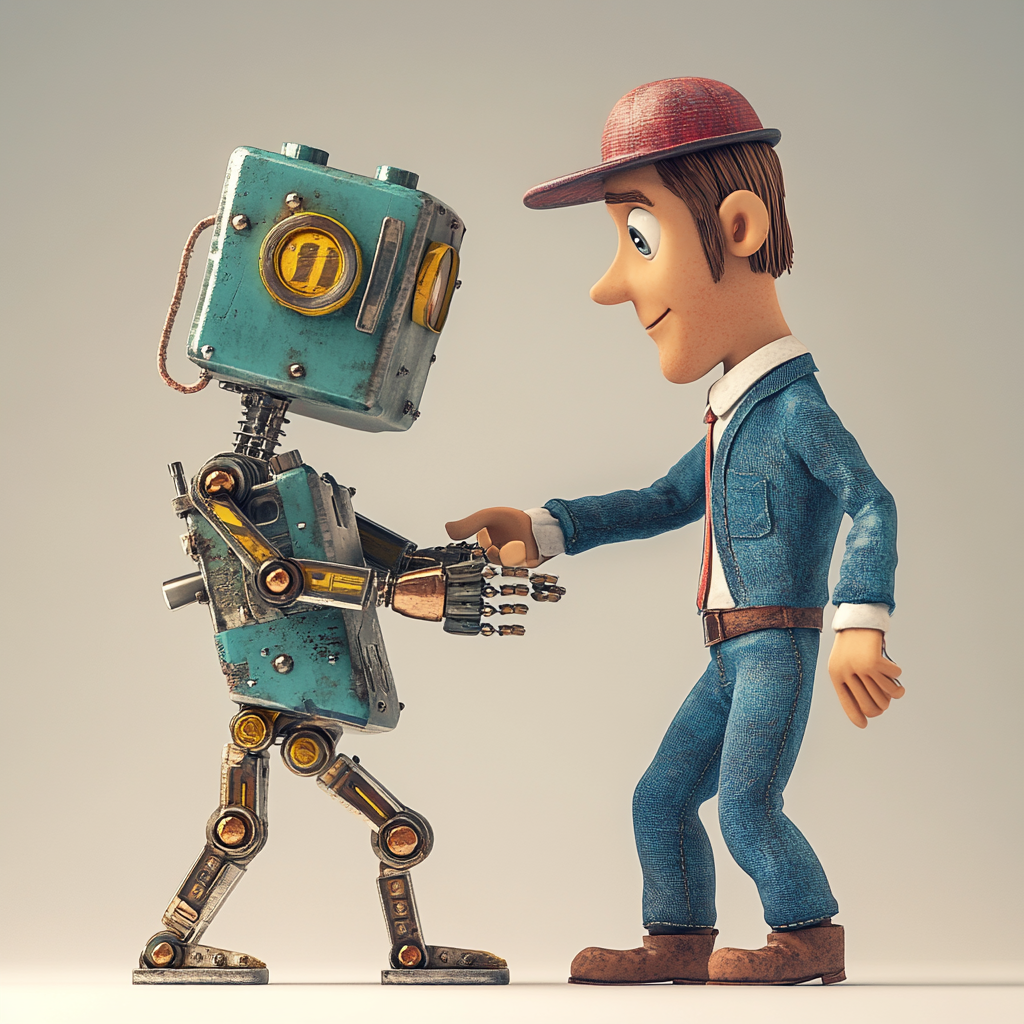AI-safe jobs and those in peril—what jobs will AI replace?

Because AI is so adept at conjuring images and churning out yards of text, many have fastened onto writers and designers as the first to tumble into the technological dustbin. It’s hardly the full story. There’s another roster of professions whose days may be numbered far sooner.
So, what jobs will AI replace? Are you at risk? Read on to find out.
The creatives are not the endangered ones
A common understanding is that creative professionals stand the greatest risk in the face of AI. This is not entirely true. One might argue it’s not true at all.
For all its spontaneous brilliance, AI doesn’t spin its marvels out of thin air. AI needs humans to prime the pump. People supply the training data, iron out biases, and interpret the results. They fine-tune every algorithmic masterpiece and, in a curious twist, become both curators and co-conspirators in AI’s creative process.
True creativity remains a distinctly human domain. Crafting an original painting or a heartfelt story isn’t just about technique; it’s about channeling inspiration, cultural nuances, and emotional depth in ways no algorithm can fully replicate.
We may—if we’re not there already—be on the cusp of a renaissance in which human-made, less “perfect” work is prized for its authenticity. As AI-generated images and texts proliferate, genuine human touch might become not only rarer but also more stylish. So before we write off the creatives, let’s remember that imperfection can be a virtue—and sometimes, a machine’s flawlessness simply can’t compete.
A pristine replica might dazzle, but can it ever stir our emotions like a genuine original? This begs the question: if not the creatives, what jobs will AI replace?
That which can be automated, will be automated
That same rosy future seems less likely for roles centered around easily automated, emotionally detached tasks. Let’s face it: there’s no hidden romance in debugging code, monitoring assembly lines, or streamlining back-end processes. In these practical, efficiency-driven fields, AI doesn’t merely assist—it readily replaces, leaving little hope for a nostalgia-driven revival of human craftsmanship.
In the first quarter of 2025, Meta initiated another wave of layoffs (5 percent of its total staff)—this time zeroing in on what the company deems its “lowest-performing employees,” according to CNBC.
Which occupations landed on the chopping block? Think “AI-replaceable” roles, also known as “roles easily automated”.
"When I received the email I was surprised by it mostly because I have a very solid performance history and no indicators of the last six months of performance problems," said one former Meta employee in an interview with Insider.
It’s not really about performance; it’s about priorities.
Jobs that AI is likely to replace
When decision-makers see a quicker, cheaper, or more efficient alternative, they’ll inevitably choose it. Unlike art, which thrives on emotion and originality, many roles will be sidelined not because AI suddenly takes over, but because humans deliberately opt for automated solutions.
At the end of the day, it’s not AI replacing humans—it’s humans replacing humans with a new tool.
Manufacturing
Once upon a time, it was the assembly line that changed the game, but these days advanced robotics and AI are the real power players. Automated systems can weld, assemble, and pack with near-perfect precision, sidelining traditional factory workers—unless they’re trained to operate or maintain the machines. However, in answering the question: what jobs will AI replace first? This is probably it.
Defense and military
Increasingly, commanders rely on AI-driven strategies that parse intelligence data and pilot fleets of unmanned vehicles with unsettling efficiency. The foot soldier might never vanish altogether, but old-school roles are coming under scrutiny as automated analytics outmaneuver human tacticians at breakneck speed.
Telemarketing
Those persistent calls over dinner could soon come from AI chatbots so deftly programmed you’d never know you’re talking to a machine. These systems can handle thousands of leads at once, tailor their scripts on the fly, and never tire out or lose patience.
Portfolio management
Algorithmic traders and AI-driven analytics make moves in the blink of an eye, spotting market shifts before your morning latte cools. Gone are the days of the cautious manager poring over quarterlies in a wood-paneled office. Automated systems scan mountains of data 24/7, recalibrating portfolios in real time.
Translation
Once, human translators were the gatekeepers of cross-cultural communication, but today’s AI can churn out multiple languages on demand—and with remarkable accuracy. Automated translation works at lightning speed, never needs a break, and can handle volumes that would overwhelm a team of people.
Bookkeeping and accounting
Rows of ledgers and hours of double-checking are becoming relics in an era where AI-based software reconciles accounts at the click of a button. These smart systems don’t just crunch numbers; they also flag anomalies and even propose ways to improve cash flow.
AI-safe jobs
Certain jobs remain firmly human territory—those rooted in empathy, creativity, intuition, or complex problem-solving. AI won’t easily replicate the spark behind inspired storytelling, empathetic care, or visionary project management. These professions aren't just surviving AI’s advance; they're thriving alongside it.
Journalists
Sure, AI can spit out reams of content, but genuine journalism relies on a nose for news, an investigative spirit, and the human capacity for nuance. Good reporters don’t just relay facts—they uncover hidden truths, shape public discourse, and earn trust by showing up where the action is. That’s not something an algorithm can do from a server room.
Musicians
AI can compose everything from catchy jingles to ambient soundscapes, but there’s still a quixotic magic in human-made music. A machine can’t replicate the spark of inspiration that hits at 3 a.m., nor can it capture the subtle interplay of live performers riffing off one another in real time. Audiences crave that personal connection—a new riff, a fleeting moment of improv that never happens the same way twice. For all AI’s precision, the human soul in music remains irreplaceable.
Healthcare professionals
Doctors, nurses, and other healthcare heroes pair medical know-how with something AI just can’t match: compassion. While algorithms help diagnose diseases and suggest treatment plans at lightning speed, patients still want a reassuring voice and a steady hand when it counts. Healthcare pros also adapt on the fly, juggling unforeseen complications that can’t always be coded into a program.
Civil engineers
Robots may haul beams and AI might run predictive models, but designing and maintaining the backbone of modern civilization—think bridges, roads, and skyscrapers—demands a distinct human touch. Civil engineers marry theoretical math with on-the-ground pragmatism, navigating everything from local building codes to unpredictable weather patterns.
AI jobs
Strangely enough, the folks who build AI often enjoy some of the safest seats in the house. Data scientists, machine learning engineers, prompt engineers, AI ethicists—they’re the ones sculpting these digital brains and keeping them on the rails. And as AI evolves, new specialized roles keep popping up, from bias auditors to AI experience designers.
Project managers
Any seasoned project manager will tell you: herding cats might be easier than juggling timelines, budgets, and interdepartmental egos. AI can automate tasks and track progress, but it can’t broker a heated negotiation or sense tension in a stakeholder’s tone. The human element of leadership—motivating teams, sniffing out risks, and course-correcting when surprises arise—isn’t going away anytime soon.
Do not fear the disruption—it’s part of the evolution
In a 2023 report, Goldman Sachs projected that AI could take over as many as 300 million full-time jobs. Meanwhile, that same year, McKinsey predicted that by 2030, up to 375 million workers could be displaced by AI.
While these figures seem daunting, they’re not the whole story. “Displacement” doesn’t translate to outright elimination—new positions emerge as industries adapt, from prompt engineers to AI ethicists and beyond, creating a job market where replacement is often just another form of transformation. (See this list from Forbes on 20 new work roles AI could create to ease your anxiety.)
This is hardly a first. In the early 1900s, the rise of factory automation replaced legions of artisans and small-scale factory workers. By the latter half of the twentieth century, ATMs rattled the banking industry and edged out many bank tellers. Then, the dawn of e-commerce in the early 2000s shook up retail. Each upheaval sparked new opportunities in its wake, a pattern we may well see repeated.
Had people in those eras asked, not “What jobs will AI replace?” but “What jobs will factory automation or e-commerce replace?”—would they have known the answer? Chances are, the future looked just as unpredictable then as it does now.
Additionally, it’s the general public who currently deem AI the most threatening. According to a 2025 Pew Research Center survey, the public is far more concerned about AI’s potential negative effects on jobs than industry experts are. Instead, many experts are hopeful.
Even the AI insiders remain optimistic—maybe we can afford a little optimism as well?

Wail El Badaoui
Wail is a seasoned Product Manager with over 7 years of experience. Specializing in building and optimizing AI-powered products. Wail is passionate about leveraging AI tools to simplify workflows, boost productivity, and create a more balanced work-life environment. When not streamlining user experiences, Wail enjoys experimenting with new tech, fine-tuning productivity hacks, and sharing insights on optimizing work.